
sailor-llm
Sailor: Open Language Models for South-East Asia
Stars: 71

Sailor is a suite of open language models tailored for South-East Asia (SEA), focusing on languages such as Indonesian, Thai, Vietnamese, Malay, and Lao. Developed with careful data curation, Sailor models are designed to understand and generate text across diverse linguistic landscapes of the SEA region. Built from Qwen 1.5, Sailor encompasses models of varying sizes, spanning from 0.5B to 7B versions for different requirements. Benchmarking results demonstrate Sailor's proficiency in tasks such as question answering, commonsense reasoning, reading comprehension, and more in SEA languages.
README:
This repository contains the evaluation code for Sailor, a suite of open language models for South-East Asia.
Sailor is developed by the Sea AI Lab and Singapore University of Technology and Design.
Sailor is a suite of Open Language Models tailored for South-East Asia (SEA), focusing on languages such as 🇮🇩Indonesian, 🇹🇭Thai, 🇻🇳Vietnamese, 🇲🇾Malay, and 🇱🇦Lao. Developed with careful data curation, Sailor models are designed to understand and generate text across diverse linguistic landscapes of SEA region. Built from Qwen 1.5, Sailor encompasses models of varying sizes, spanning from 0.5B to 7B versions for different requirements. Benchmarking results demonstrate Sailor's proficiency in tasks such as question answering, commonsense reasoning, reading comprehension and etc. in SEA languages.
- Continually pretrained on 200 Billion to 400 Billion tokens over 7 languages, including Indonesian, Thai, Vietnamese, Malay, Lao, English and Chinese.
- Various model sizes (0.5B, 1.8B, 4B and 7B) to support different requirements.
- Strong performance on SEA benchmarks such as XQuAD, TydiQA, XCOPA, Belebele and M3Exam.
- No restrict on the research and the commercial use, but should comply with the Qwen 1.5 license.
To learn more details, please access the technical report.
You can find all the Sailor models in our Huggingface home page here:
- Sailor-0.5B
- Sailor-1.8B
- Sailor-4B
- Sailor-7B
- Sailor-0.5B-Chat
- Sailor-1.8B-Chat
- Sailor-4B-Chat
- Sailor-7B-Chat
Here are the results of the evaluation of the models on question answering tasks. The evaluation results are presented in the form of tables, where the first column is the model name, and the reset columns are the performance on Thai (th), Indonesian (id), and Vietnamese (vi) languages, respectively. The results of Sailor models are highlighted in bold. You can find the full evaluation results on the different tasks and our evaluation code to reproduce the results in the eval directory.
| 3-shot (EM / F1) | XQuAD (th) | TydiQA (id) | XQuAD (vi) |
|---|---|---|---|
| Qwen1.5-0.5B | 14.19 / 23.35 | 20.71 / 32.64 | 19.85 / 35.38 |
| Sailor-0.5B | 15.84 / 27.58 | 30.44 / 54.74 | 21.13 / 40.57 |
| Qwen1.5-1.8B | 27.24 / 43.56 | 29.73 / 53.76 | 29.17 / 48.15 |
| Sailor-1.8B | 32.72 / 48.66 | 40.88 / 65.37 | 34.22 / 53.35 |
| Qwen1.5-4B | 34.03 / 53.40 | 48.32 / 72.68 | 43.71 / 63.86 |
| Sailor-4B | 46.82 / 63.34 | 53.98 / 73.48 | 47.65 / 67.09 |
| Llama-2-7b | 30.64 / 43.80 | 56.64 / 72.14 | 46.96 / 66.16 |
| Mistral-7B-v0.1 | 48.48 / 63.27 | 63.54 / 78.73 | 53.72 / 72.75 |
| SeaLLM-7b-Hybrid | 49.70 / 67.62 | 50.62 / 75.21 | 49.62 / 70.74 |
| SeaLLM-7b-v2 | 34.55 / 55.13 | 52.21 / 77.00 | 46.19 / 72.11 |
| Qwen1.5-7B | 53.79 / 69.30 | 57.17 / 77.28 | 56.63 / 76.99 |
| Sailor-7B | 57.88 / 71.06 | 60.53 / 75.42 | 53.81 / 74.62 |
We use OpenCompass to evaluate the models. To install the required packages, run the following command under this folder:
# setup opencompass environment
conda create --name opencompass python=3.10 pytorch torchvision pytorch-cuda -c nvidia -c pytorch -y
conda activate opencompass
git clone https://github.com/open-compass/opencompass opencompass
cd opencompass
pip install -e .
pip install pythainlp langid
mkdir dataTo build the evaluation script, run the following command under this folder:
cp -r eval/configs/* opencompass/configs/
cp -r eval/data/* opencompass/data/
cp -r eval/datasets/* opencompass/opencompass/datasets/
cp eval/icl_sailor_evaluator.py opencompass/opencompass/openicl/icl_evaluator/
cp eval/sailor_text_postprocessors.py opencompass/opencompass/utils/
echo "from .icl_sailor_evaluator import AnsEvaluator, TextGenEvaluator # noqa" >> "opencompass/opencompass/openicl/icl_evaluator/__init__.py"
echo "from .sailor_text_postprocessors import * # noqa" >> "opencompass/opencompass/utils/__init__.py"
echo "from .xquad import * # noqa: F401, F403" >> "opencompass/opencompass/datasets/__init__.py"
echo "from .tydiqa_id import * # noqa: F401, F403" >> "opencompass/opencompass/datasets/__init__.py"
echo "from .xcopa_sea import * # noqa: F401, F403" >> "opencompass/opencompass/datasets/__init__.py"
echo "from .m3exam import * # noqa: F401, F403" >> "opencompass/opencompass/datasets/__init__.py"
echo "from .belebele import * # noqa: F401, F403" >> "opencompass/opencompass/datasets/__init__.py"
cp eval/eval_sailor.py opencompass/configs/To run the evaluation, run the following command under this folder:
cd opencompass
python run.py configs/eval_sailor.py -w outputs/sailor --num-gpus 1 --max-num-workers 64You can also modify the script to evaluate other models like Qwen1.5, Llama, Mistral, etc.
We provide a simple demo to chat with Sailor-7B-Chat . You can also develop it using the provided demo code.
If you use this repository or sailor models, please cite
@misc{dou2024sailor,
title={Sailor: Open Language Models for South-East Asia},
author={Longxu Dou and Qian Liu and Guangtao Zeng and Jia Guo and Jiahui Zhou and Wei Lu and Min Lin},
year={2024},
eprint={2404.03608},
archivePrefix={arXiv},
primaryClass={cs.CL}
}
If you have any questions, please raise an issue in our Github or contact us at [email protected] and [email protected].
For Tasks:
Click tags to check more tools for each tasksFor Jobs:
Alternative AI tools for sailor-llm
Similar Open Source Tools

sailor-llm
Sailor is a suite of open language models tailored for South-East Asia (SEA), focusing on languages such as Indonesian, Thai, Vietnamese, Malay, and Lao. Developed with careful data curation, Sailor models are designed to understand and generate text across diverse linguistic landscapes of the SEA region. Built from Qwen 1.5, Sailor encompasses models of varying sizes, spanning from 0.5B to 7B versions for different requirements. Benchmarking results demonstrate Sailor's proficiency in tasks such as question answering, commonsense reasoning, reading comprehension, and more in SEA languages.
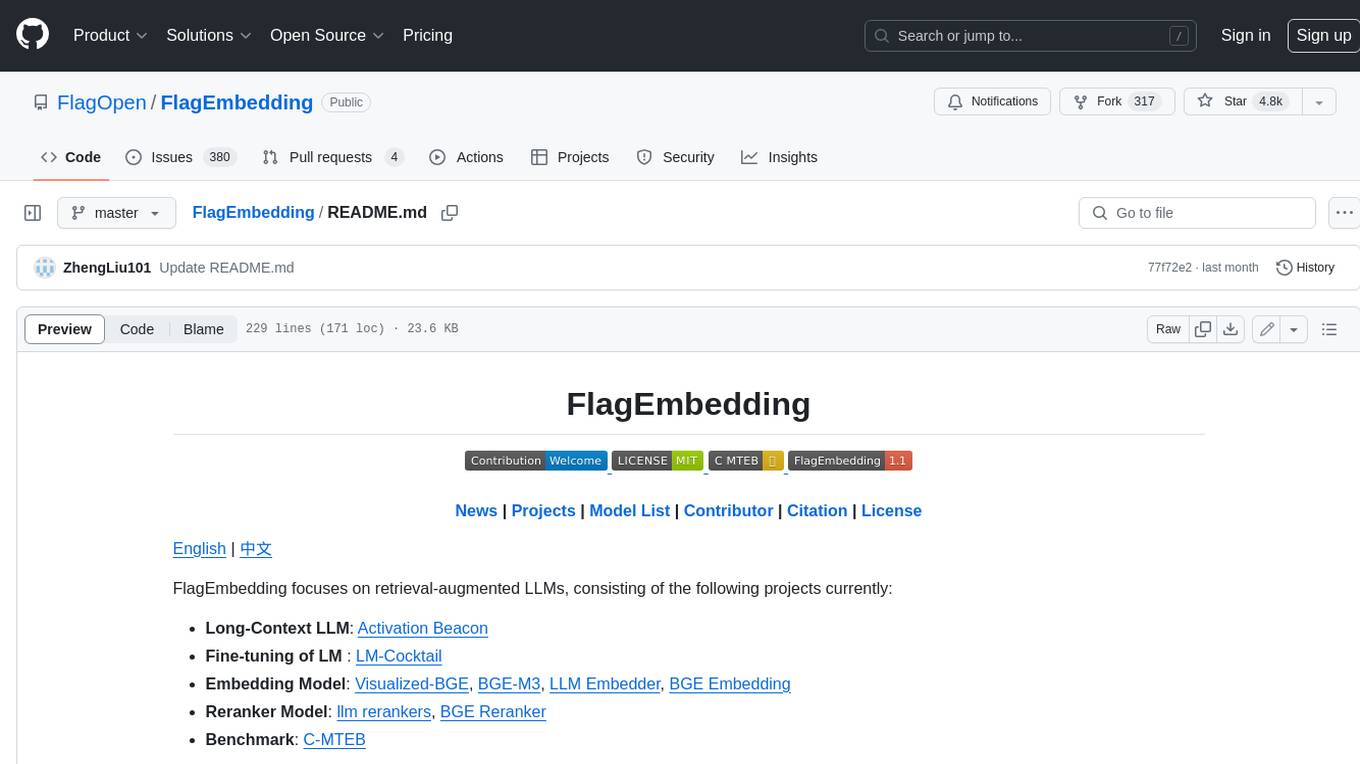
FlagEmbedding
FlagEmbedding focuses on retrieval-augmented LLMs, consisting of the following projects currently: * **Long-Context LLM** : Activation Beacon * **Fine-tuning of LM** : LM-Cocktail * **Embedding Model** : Visualized-BGE, BGE-M3, LLM Embedder, BGE Embedding * **Reranker Model** : llm rerankers, BGE Reranker * **Benchmark** : C-MTEB
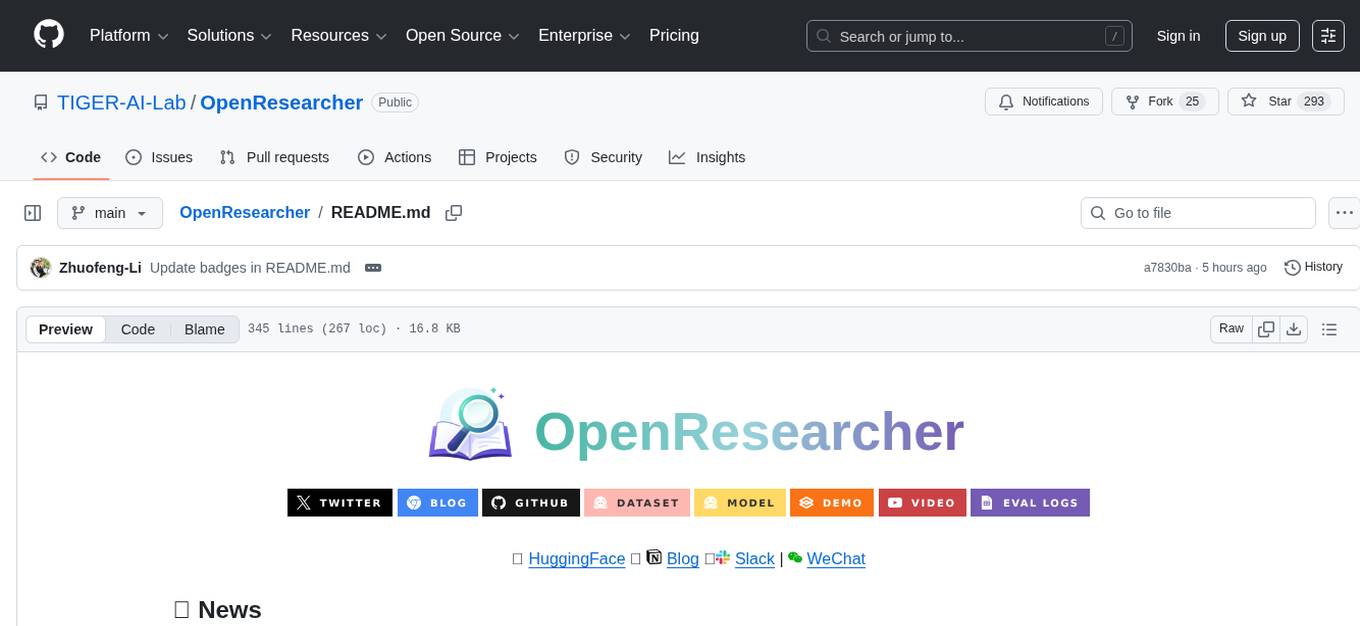
OpenResearcher
OpenResearcher is a fully open agentic large language model designed for long-horizon deep research scenarios. It achieves an impressive 54.8% accuracy on BrowseComp-Plus, surpassing performance of GPT-4.1, Claude-Opus-4, Gemini-2.5-Pro, DeepSeek-R1, and Tongyi-DeepResearch. The tool is fully open-source, providing the training and evaluation recipe—including data, model, training methodology, and evaluation framework for everyone to progress deep research. It offers features like a fully open-source recipe, highly scalable and low-cost generation of deep research trajectories, and remarkable performance on deep research benchmarks.
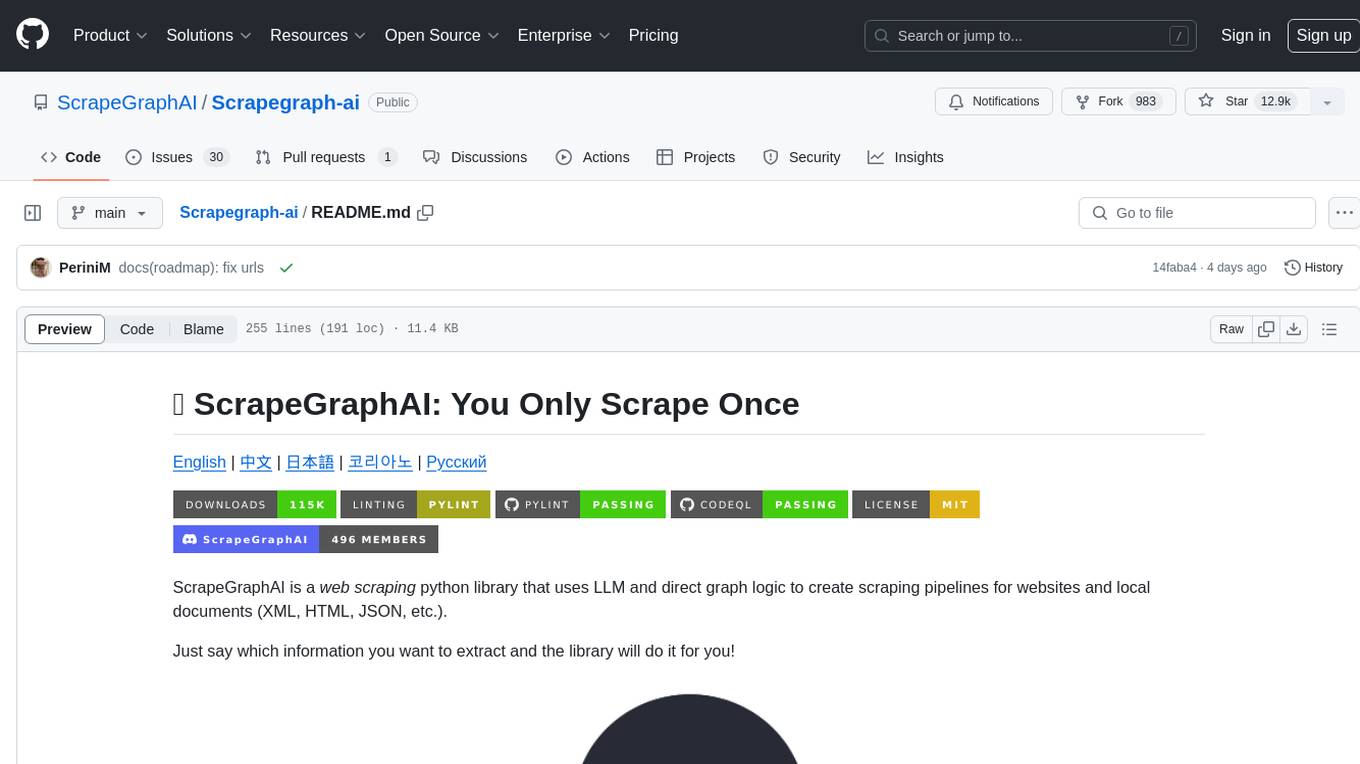
Scrapegraph-ai
ScrapeGraphAI is a web scraping Python library that utilizes LLM and direct graph logic to create scraping pipelines for websites and local documents. It offers various standard scraping pipelines like SmartScraperGraph, SearchGraph, SpeechGraph, and ScriptCreatorGraph. Users can extract information by specifying prompts and input sources. The library supports different LLM APIs such as OpenAI, Groq, Azure, and Gemini, as well as local models using Ollama. ScrapeGraphAI is designed for data exploration and research purposes, providing a versatile tool for extracting information from web pages and generating outputs like Python scripts, audio summaries, and search results.
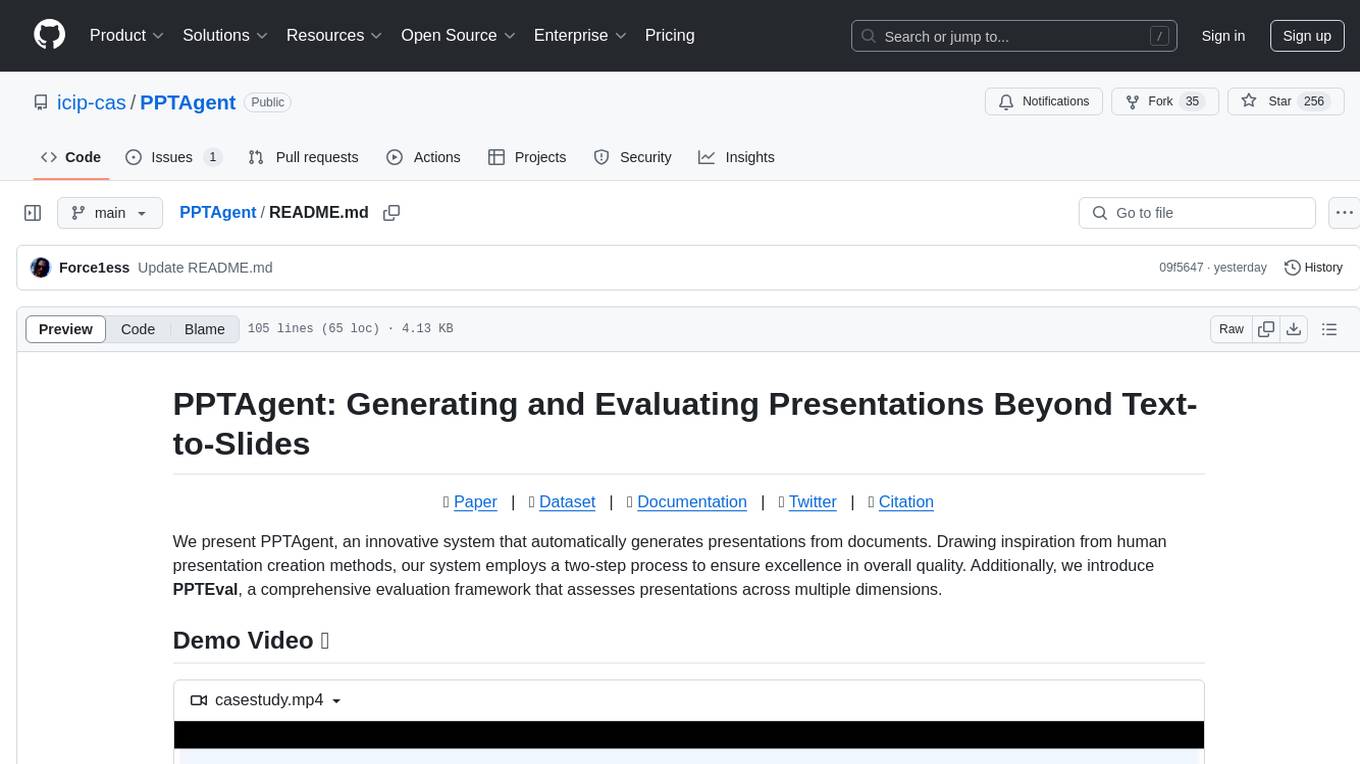
PPTAgent
PPTAgent is an innovative system that automatically generates presentations from documents. It employs a two-step process for quality assurance and introduces PPTEval for comprehensive evaluation. With dynamic content generation, smart reference learning, and quality assessment, PPTAgent aims to streamline presentation creation. The tool follows an analysis phase to learn from reference presentations and a generation phase to develop structured outlines and cohesive slides. PPTEval evaluates presentations based on content accuracy, visual appeal, and logical coherence.
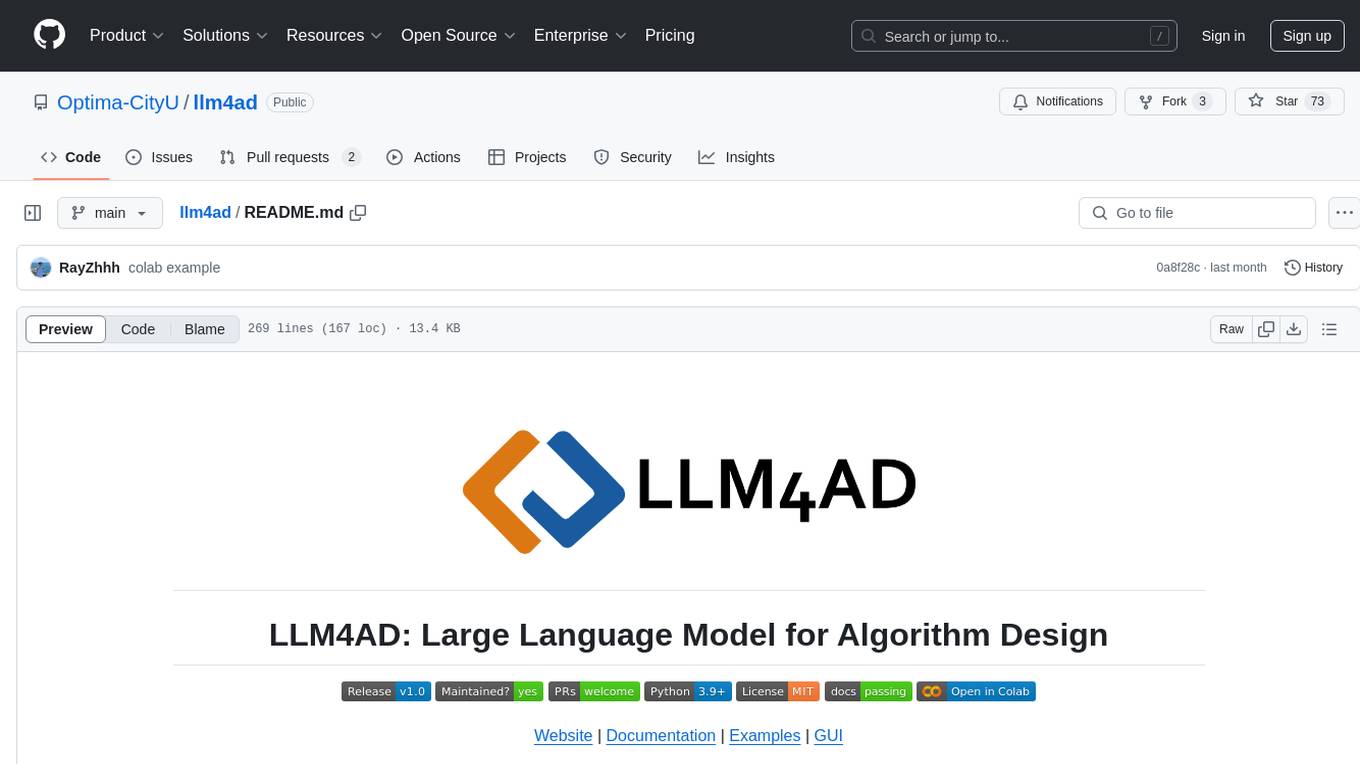
llm4ad
LLM4AD is an open-source Python-based platform leveraging Large Language Models (LLMs) for Automatic Algorithm Design (AD). It provides unified interfaces for methods, tasks, and LLMs, along with features like evaluation acceleration, secure evaluation, logs, GUI support, and more. The platform was originally developed for optimization tasks but is versatile enough to be used in other areas such as machine learning, science discovery, game theory, and engineering design. It offers various search methods and algorithm design tasks across different domains. LLM4AD supports remote LLM API, local HuggingFace LLM deployment, and custom LLM interfaces. The project is licensed under the MIT License and welcomes contributions, collaborations, and issue reports.
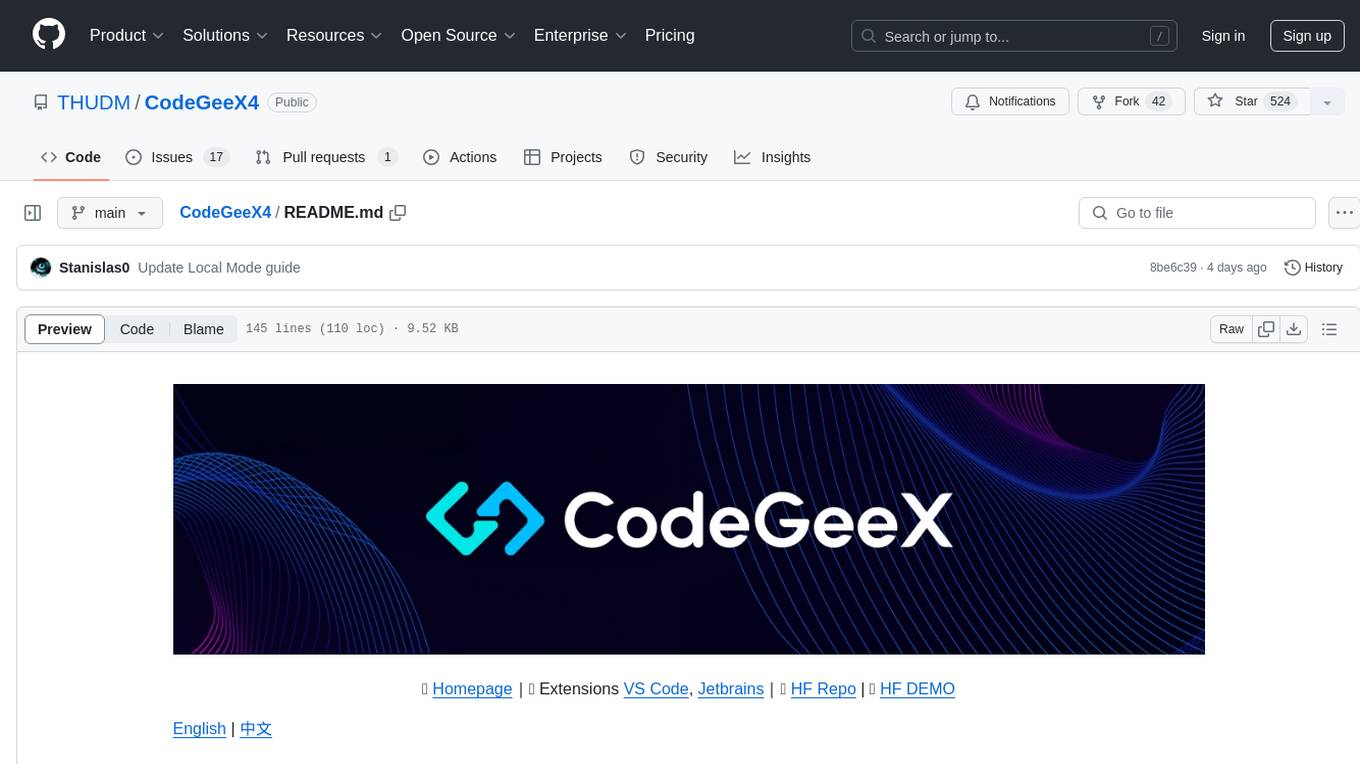
CodeGeeX4
CodeGeeX4-ALL-9B is an open-source multilingual code generation model based on GLM-4-9B, offering enhanced code generation capabilities. It supports functions like code completion, code interpreter, web search, function call, and repository-level code Q&A. The model has competitive performance on benchmarks like BigCodeBench and NaturalCodeBench, outperforming larger models in terms of speed and performance.
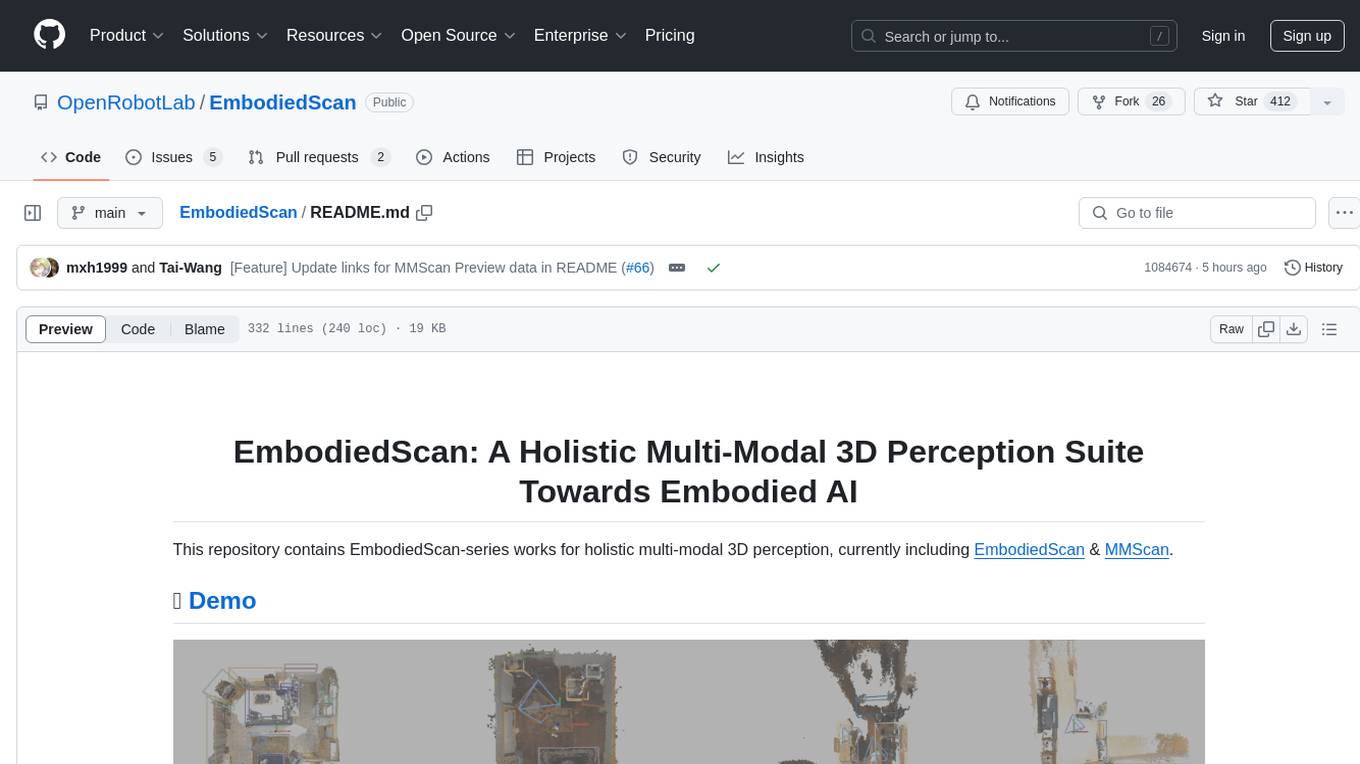
EmbodiedScan
EmbodiedScan is a holistic multi-modal 3D perception suite designed for embodied AI. It introduces a multi-modal, ego-centric 3D perception dataset and benchmark for holistic 3D scene understanding. The dataset includes over 5k scans with 1M ego-centric RGB-D views, 1M language prompts, 160k 3D-oriented boxes spanning 760 categories, and dense semantic occupancy with 80 common categories. The suite includes a baseline framework named Embodied Perceptron, capable of processing multi-modal inputs for 3D perception tasks and language-grounded tasks.
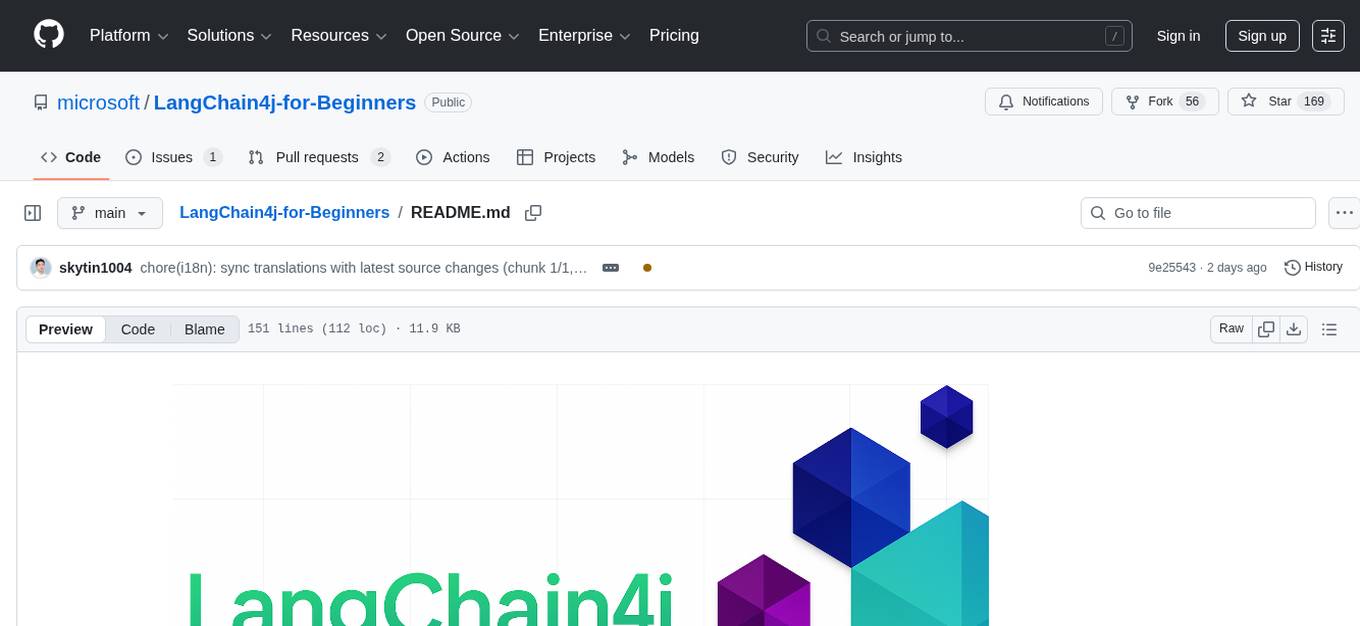
LangChain4j-for-Beginners
LangChain4j-for-Beginners is a course designed to help beginners build AI applications using LangChain4j and Azure OpenAI GPT-5.2. The course covers topics such as chatbots, AI agents, prompt engineering, and integrating external tools. Learners can use GitHub Models and Azure OpenAI for different modules. The repository includes 50+ language translations, but users can clone without translations for faster download. The course provides a learning path, GitHub Copilot integration for paired programming, and additional resources related to LangChain, Azure, generative AI, core learning, and Copilot series. Learners can get help through the Azure AI Foundry Discord community or the Azure AI Foundry Developer Forum.
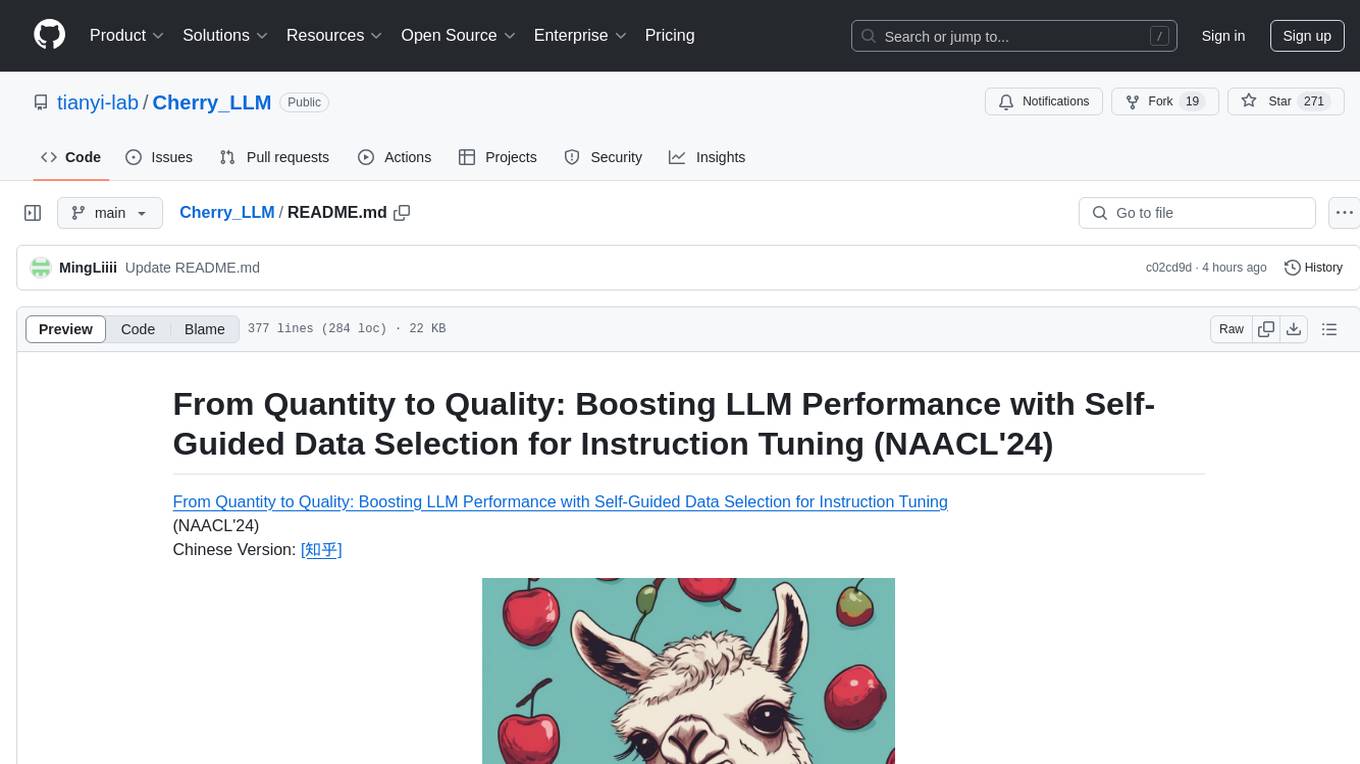
Cherry_LLM
Cherry Data Selection project introduces a self-guided methodology for LLMs to autonomously discern and select cherry samples from open-source datasets, minimizing manual curation and cost for instruction tuning. The project focuses on selecting impactful training samples ('cherry data') to enhance LLM instruction tuning by estimating instruction-following difficulty. The method involves phases like 'Learning from Brief Experience', 'Evaluating Based on Experience', and 'Retraining from Self-Guided Experience' to improve LLM performance.
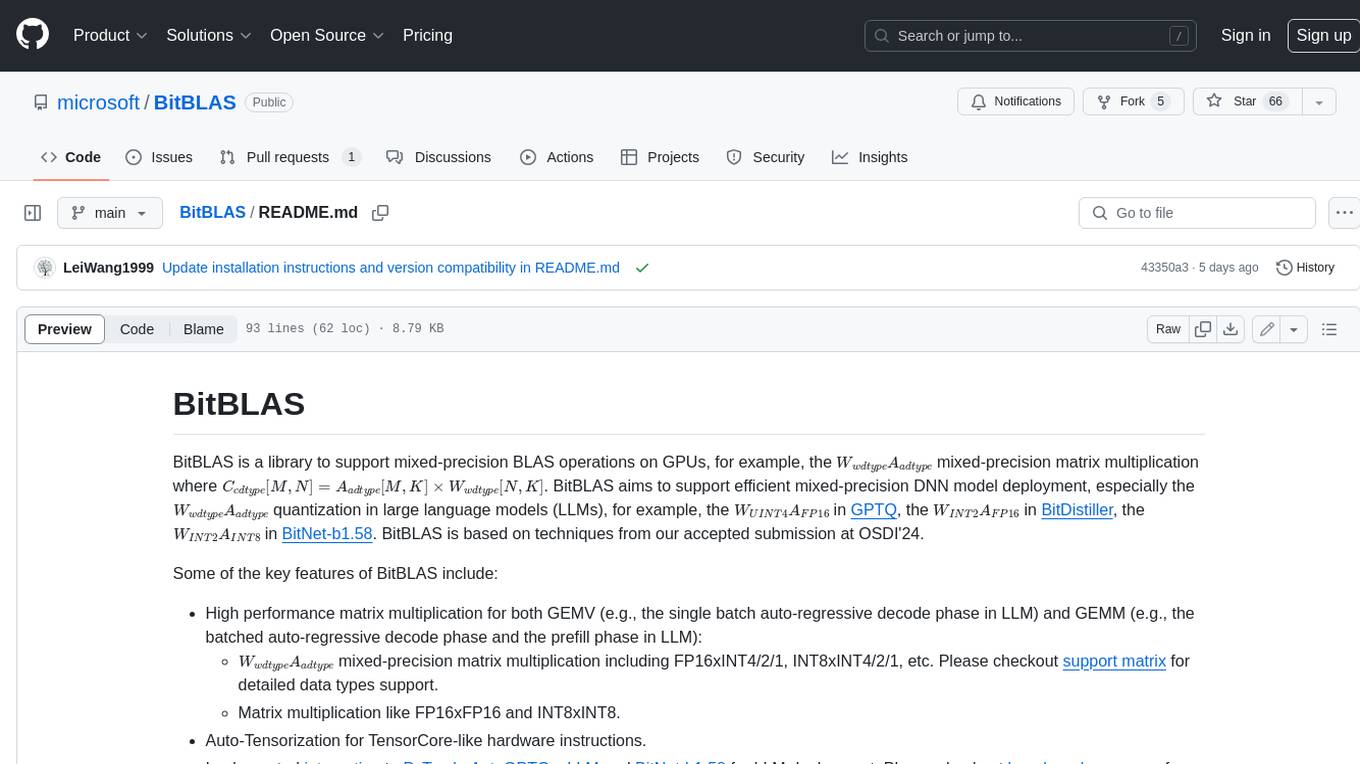
BitBLAS
BitBLAS is a library for mixed-precision BLAS operations on GPUs, for example, the $W_{wdtype}A_{adtype}$ mixed-precision matrix multiplication where $C_{cdtype}[M, N] = A_{adtype}[M, K] \times W_{wdtype}[N, K]$. BitBLAS aims to support efficient mixed-precision DNN model deployment, especially the $W_{wdtype}A_{adtype}$ quantization in large language models (LLMs), for example, the $W_{UINT4}A_{FP16}$ in GPTQ, the $W_{INT2}A_{FP16}$ in BitDistiller, the $W_{INT2}A_{INT8}$ in BitNet-b1.58. BitBLAS is based on techniques from our accepted submission at OSDI'24.
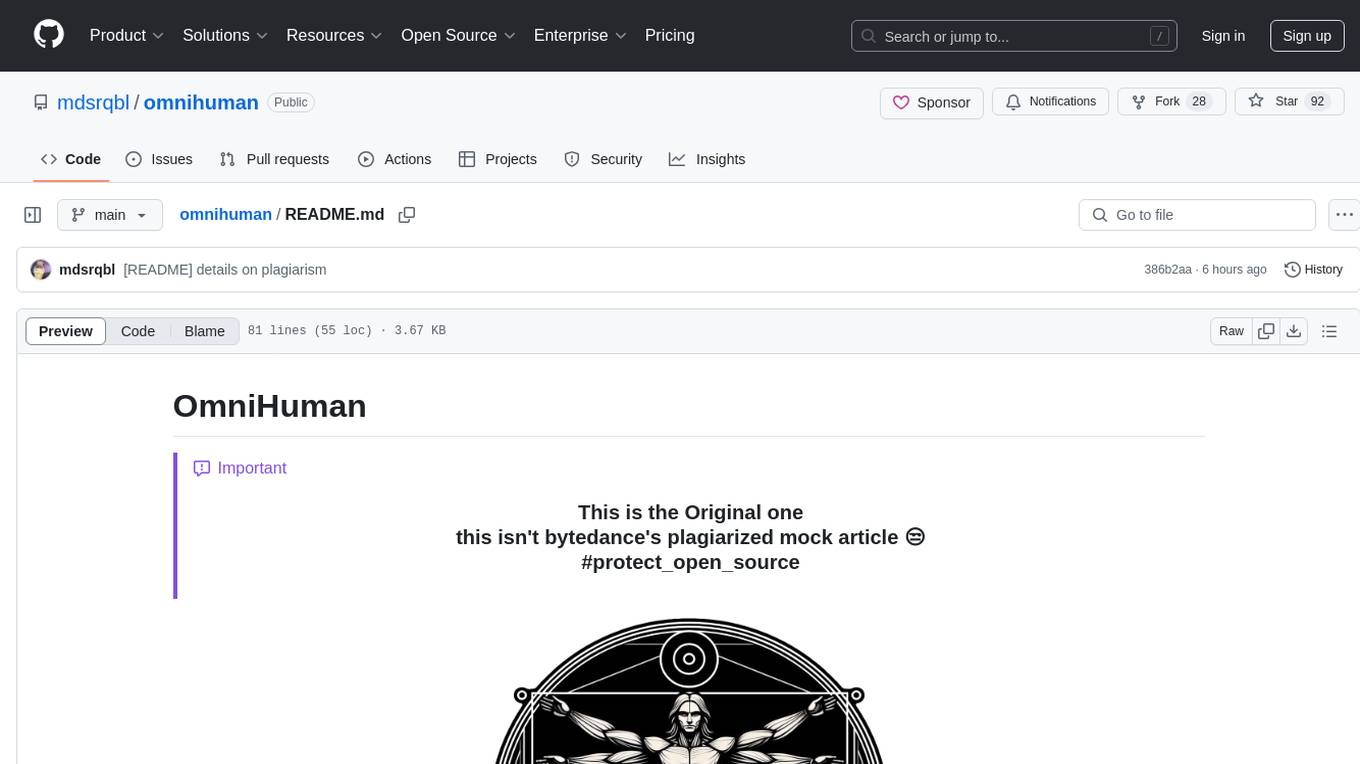
omnihuman
OmniHuman is an AI model designed to understand humanoids and text. It provides functionalities to process images and videos, generating text descriptions for human actions depicted in the visual content. The tool offers support for various tasks related to human pose recognition and action understanding. Users can easily integrate OmniHuman into their projects to enhance the capabilities of their applications in recognizing and interpreting human actions in images and videos.
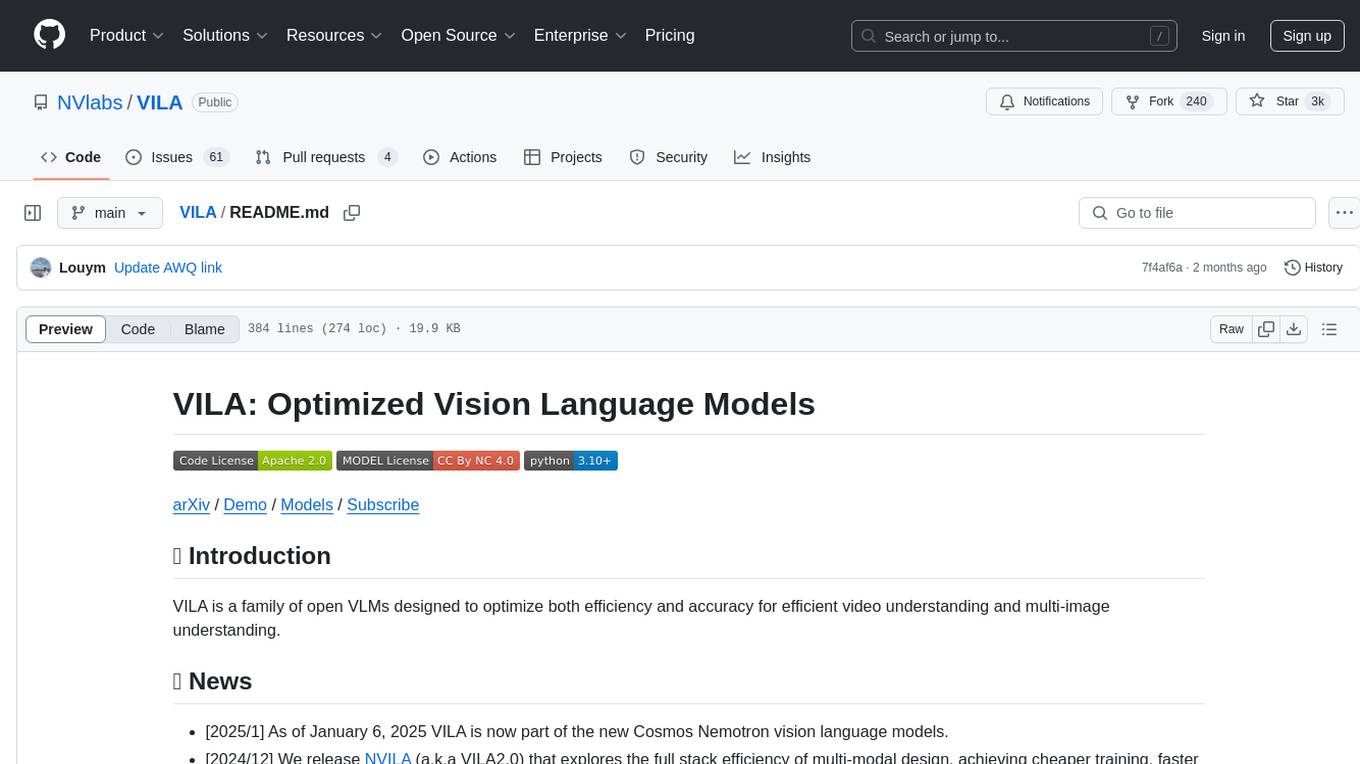
VILA
VILA is a family of open Vision Language Models optimized for efficient video understanding and multi-image understanding. It includes models like NVILA, LongVILA, VILA-M3, VILA-U, and VILA-1.5, each offering specific features and capabilities. The project focuses on efficiency, accuracy, and performance in various tasks related to video, image, and language understanding and generation. VILA models are designed to be deployable on diverse NVIDIA GPUs and support long-context video understanding, medical applications, and multi-modal design.
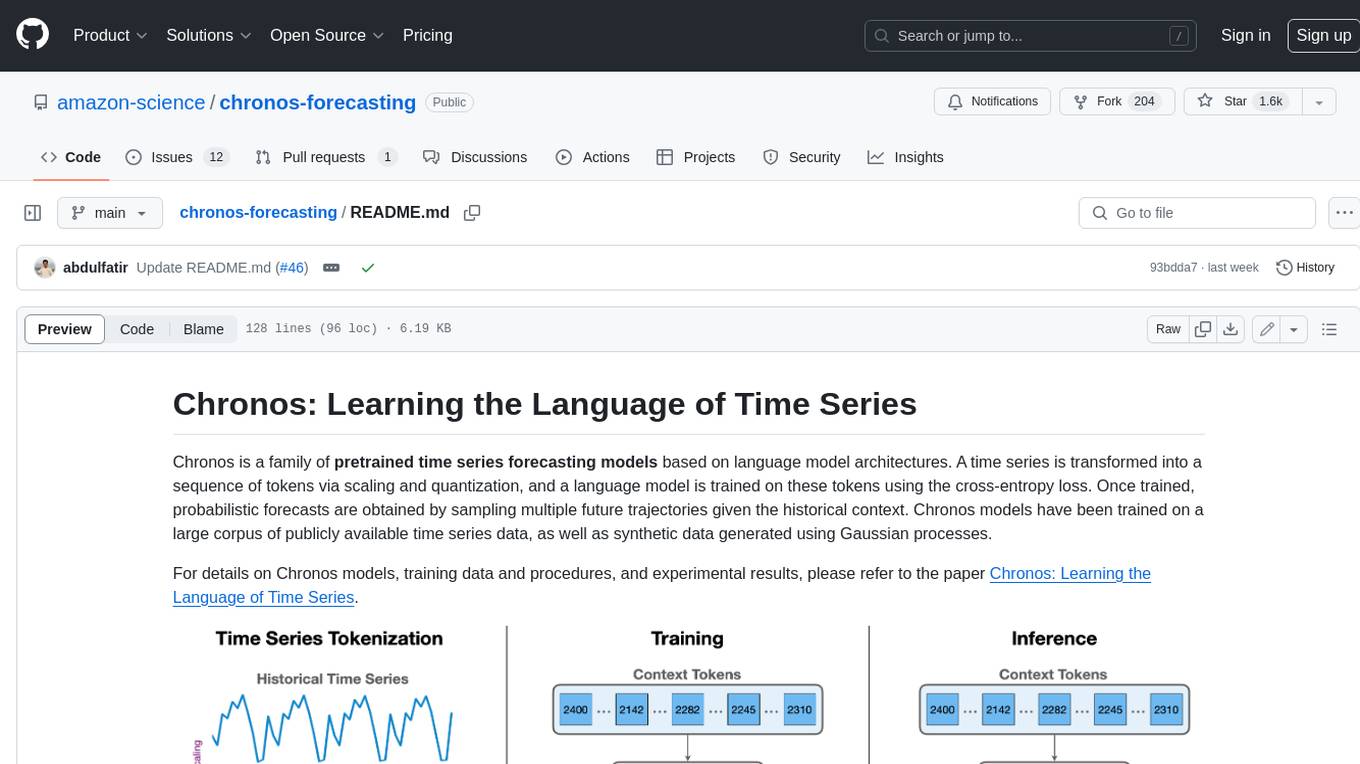
chronos-forecasting
Chronos is a family of pretrained time series forecasting models based on language model architectures. A time series is transformed into a sequence of tokens via scaling and quantization, and a language model is trained on these tokens using the cross-entropy loss. Once trained, probabilistic forecasts are obtained by sampling multiple future trajectories given the historical context. Chronos models have been trained on a large corpus of publicly available time series data, as well as synthetic data generated using Gaussian processes.
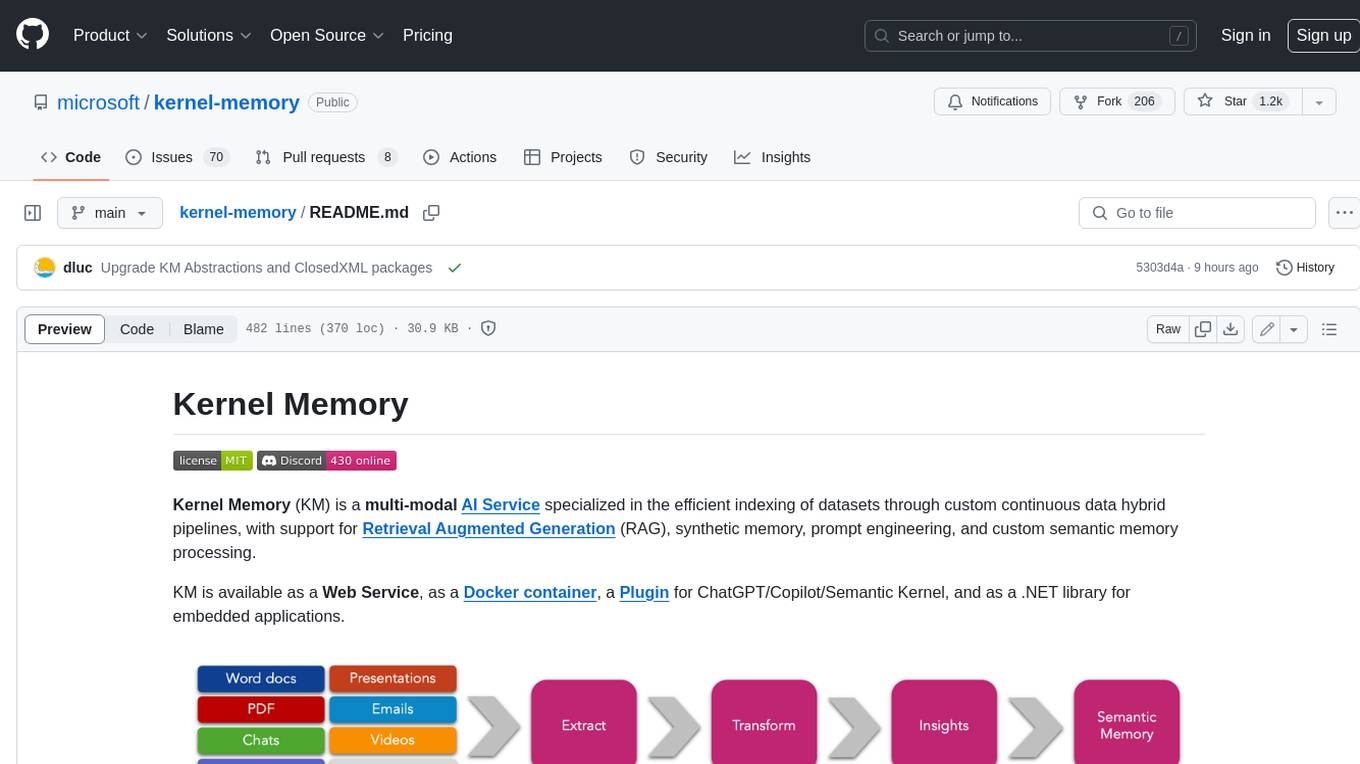
kernel-memory
Kernel Memory (KM) is a multi-modal AI Service specialized in the efficient indexing of datasets through custom continuous data hybrid pipelines, with support for Retrieval Augmented Generation (RAG), synthetic memory, prompt engineering, and custom semantic memory processing. KM is available as a Web Service, as a Docker container, a Plugin for ChatGPT/Copilot/Semantic Kernel, and as a .NET library for embedded applications. Utilizing advanced embeddings and LLMs, the system enables Natural Language querying for obtaining answers from the indexed data, complete with citations and links to the original sources. Designed for seamless integration as a Plugin with Semantic Kernel, Microsoft Copilot and ChatGPT, Kernel Memory enhances data-driven features in applications built for most popular AI platforms.
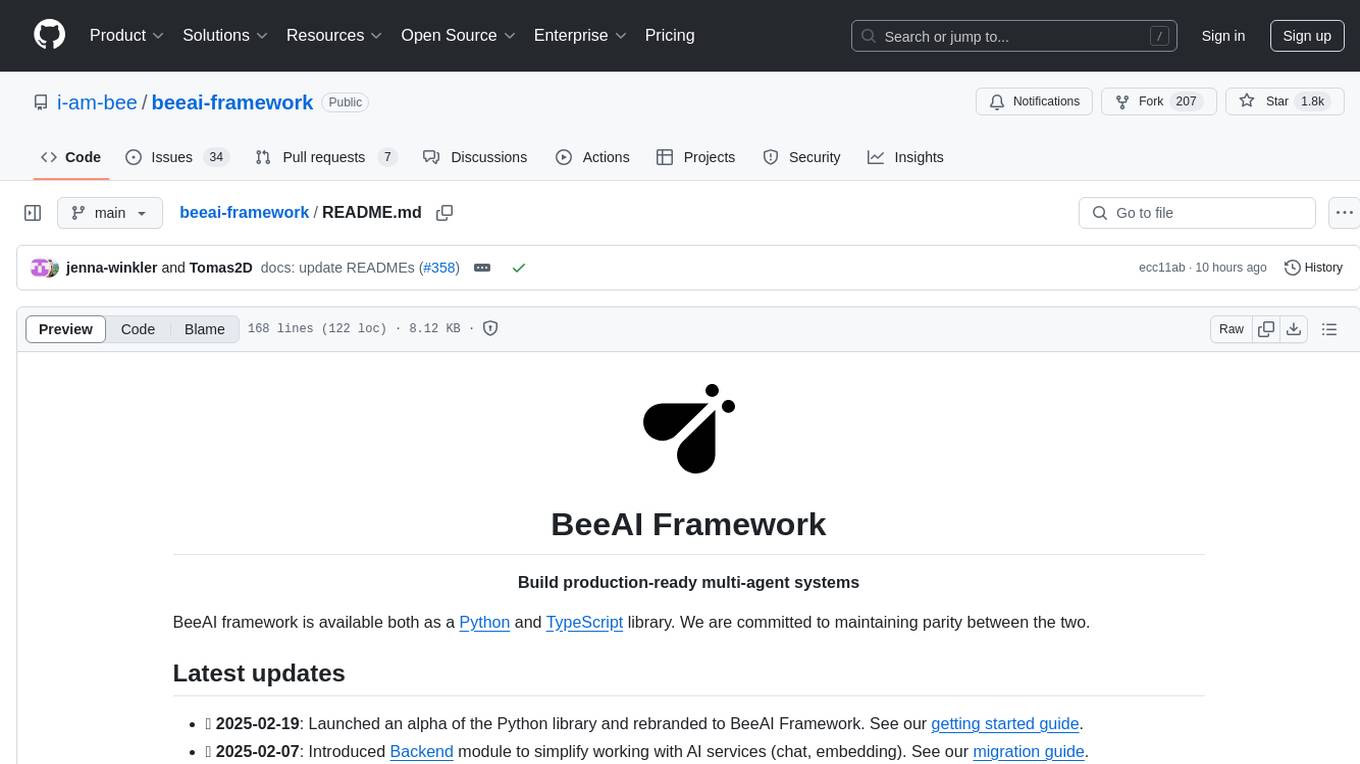
beeai-framework
BeeAI Framework is a versatile tool for building production-ready multi-agent systems. It offers flexibility in orchestrating agents, seamless integration with various models and tools, and production-grade controls for scaling. The framework supports Python and TypeScript libraries, enabling users to implement simple to complex multi-agent patterns, connect with AI services, and optimize token usage and resource management.
For similar tasks

LLMStack
LLMStack is a no-code platform for building generative AI agents, workflows, and chatbots. It allows users to connect their own data, internal tools, and GPT-powered models without any coding experience. LLMStack can be deployed to the cloud or on-premise and can be accessed via HTTP API or triggered from Slack or Discord.

ai-guide
This guide is dedicated to Large Language Models (LLMs) that you can run on your home computer. It assumes your PC is a lower-end, non-gaming setup.

onnxruntime-genai
ONNX Runtime Generative AI is a library that provides the generative AI loop for ONNX models, including inference with ONNX Runtime, logits processing, search and sampling, and KV cache management. Users can call a high level `generate()` method, or run each iteration of the model in a loop. It supports greedy/beam search and TopP, TopK sampling to generate token sequences, has built in logits processing like repetition penalties, and allows for easy custom scoring.

jupyter-ai
Jupyter AI connects generative AI with Jupyter notebooks. It provides a user-friendly and powerful way to explore generative AI models in notebooks and improve your productivity in JupyterLab and the Jupyter Notebook. Specifically, Jupyter AI offers: * An `%%ai` magic that turns the Jupyter notebook into a reproducible generative AI playground. This works anywhere the IPython kernel runs (JupyterLab, Jupyter Notebook, Google Colab, Kaggle, VSCode, etc.). * A native chat UI in JupyterLab that enables you to work with generative AI as a conversational assistant. * Support for a wide range of generative model providers, including AI21, Anthropic, AWS, Cohere, Gemini, Hugging Face, NVIDIA, and OpenAI. * Local model support through GPT4All, enabling use of generative AI models on consumer grade machines with ease and privacy.

khoj
Khoj is an open-source, personal AI assistant that extends your capabilities by creating always-available AI agents. You can share your notes and documents to extend your digital brain, and your AI agents have access to the internet, allowing you to incorporate real-time information. Khoj is accessible on Desktop, Emacs, Obsidian, Web, and Whatsapp, and you can share PDF, markdown, org-mode, notion files, and GitHub repositories. You'll get fast, accurate semantic search on top of your docs, and your agents can create deeply personal images and understand your speech. Khoj is self-hostable and always will be.

langchain_dart
LangChain.dart is a Dart port of the popular LangChain Python framework created by Harrison Chase. LangChain provides a set of ready-to-use components for working with language models and a standard interface for chaining them together to formulate more advanced use cases (e.g. chatbots, Q&A with RAG, agents, summarization, extraction, etc.). The components can be grouped into a few core modules: * **Model I/O:** LangChain offers a unified API for interacting with various LLM providers (e.g. OpenAI, Google, Mistral, Ollama, etc.), allowing developers to switch between them with ease. Additionally, it provides tools for managing model inputs (prompt templates and example selectors) and parsing the resulting model outputs (output parsers). * **Retrieval:** assists in loading user data (via document loaders), transforming it (with text splitters), extracting its meaning (using embedding models), storing (in vector stores) and retrieving it (through retrievers) so that it can be used to ground the model's responses (i.e. Retrieval-Augmented Generation or RAG). * **Agents:** "bots" that leverage LLMs to make informed decisions about which available tools (such as web search, calculators, database lookup, etc.) to use to accomplish the designated task. The different components can be composed together using the LangChain Expression Language (LCEL).

danswer
Danswer is an open-source Gen-AI Chat and Unified Search tool that connects to your company's docs, apps, and people. It provides a Chat interface and plugs into any LLM of your choice. Danswer can be deployed anywhere and for any scale - on a laptop, on-premise, or to cloud. Since you own the deployment, your user data and chats are fully in your own control. Danswer is MIT licensed and designed to be modular and easily extensible. The system also comes fully ready for production usage with user authentication, role management (admin/basic users), chat persistence, and a UI for configuring Personas (AI Assistants) and their Prompts. Danswer also serves as a Unified Search across all common workplace tools such as Slack, Google Drive, Confluence, etc. By combining LLMs and team specific knowledge, Danswer becomes a subject matter expert for the team. Imagine ChatGPT if it had access to your team's unique knowledge! It enables questions such as "A customer wants feature X, is this already supported?" or "Where's the pull request for feature Y?"

infinity
Infinity is an AI-native database designed for LLM applications, providing incredibly fast full-text and vector search capabilities. It supports a wide range of data types, including vectors, full-text, and structured data, and offers a fused search feature that combines multiple embeddings and full text. Infinity is easy to use, with an intuitive Python API and a single-binary architecture that simplifies deployment. It achieves high performance, with 0.1 milliseconds query latency on million-scale vector datasets and up to 15K QPS.
For similar jobs

ChatFAQ
ChatFAQ is an open-source comprehensive platform for creating a wide variety of chatbots: generic ones, business-trained, or even capable of redirecting requests to human operators. It includes a specialized NLP/NLG engine based on a RAG architecture and customized chat widgets, ensuring a tailored experience for users and avoiding vendor lock-in.

agentcloud
AgentCloud is an open-source platform that enables companies to build and deploy private LLM chat apps, empowering teams to securely interact with their data. It comprises three main components: Agent Backend, Webapp, and Vector Proxy. To run this project locally, clone the repository, install Docker, and start the services. The project is licensed under the GNU Affero General Public License, version 3 only. Contributions and feedback are welcome from the community.

anything-llm
AnythingLLM is a full-stack application that enables you to turn any document, resource, or piece of content into context that any LLM can use as references during chatting. This application allows you to pick and choose which LLM or Vector Database you want to use as well as supporting multi-user management and permissions.

ai-guide
This guide is dedicated to Large Language Models (LLMs) that you can run on your home computer. It assumes your PC is a lower-end, non-gaming setup.

Magick
Magick is a groundbreaking visual AIDE (Artificial Intelligence Development Environment) for no-code data pipelines and multimodal agents. Magick can connect to other services and comes with nodes and templates well-suited for intelligent agents, chatbots, complex reasoning systems and realistic characters.

glide
Glide is a cloud-native LLM gateway that provides a unified REST API for accessing various large language models (LLMs) from different providers. It handles LLMOps tasks such as model failover, caching, key management, and more, making it easy to integrate LLMs into applications. Glide supports popular LLM providers like OpenAI, Anthropic, Azure OpenAI, AWS Bedrock (Titan), Cohere, Google Gemini, OctoML, and Ollama. It offers high availability, performance, and observability, and provides SDKs for Python and NodeJS to simplify integration.

chatbot-ui
Chatbot UI is an open-source AI chat app that allows users to create and deploy their own AI chatbots. It is easy to use and can be customized to fit any need. Chatbot UI is perfect for businesses, developers, and anyone who wants to create a chatbot.

onnxruntime-genai
ONNX Runtime Generative AI is a library that provides the generative AI loop for ONNX models, including inference with ONNX Runtime, logits processing, search and sampling, and KV cache management. Users can call a high level `generate()` method, or run each iteration of the model in a loop. It supports greedy/beam search and TopP, TopK sampling to generate token sequences, has built in logits processing like repetition penalties, and allows for easy custom scoring.




